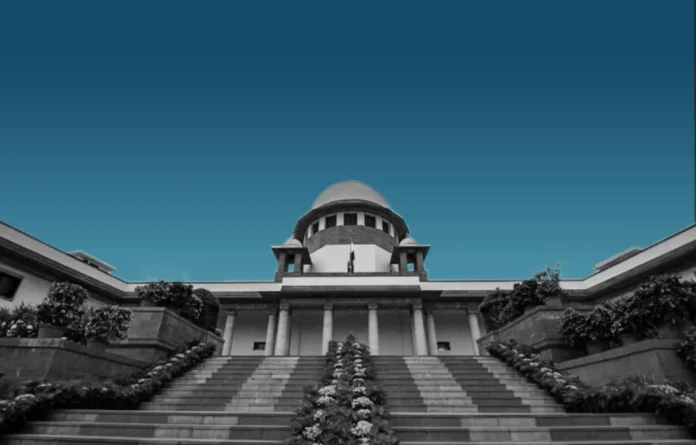In order to prevent the segregation and division of labour in prisons solely on the basis of the caste of the inmates, the Supreme Court on Thursday laid down crucial guidelines.
The Bench of Chief Justice of India DY Chandrachud, Justice JB Pardiwala and Justice Manoj Misra struck down the provisions of Prison Manuals of several States as per which jobs were assigned to the jailmates on the basis of their castes.
The Apex Court held that assigning cleaning and sweeping to the marginalised castes and assigning cooking to higher-caste prisoners was nothing, but direct caste discrimination and an aspect of untouchability.
It said the provisions allowing for caste-based segregation violated Articles 14, 15, 17, 21 and 23 of the Constitution.
The Bench further took objection to the provisions of the UP Prison Manual, which provided that a person undergoing simple imprisonment need not be given menial work unless the people of his caste were used to doing such jobs.
Noting that no group was born as a scavenger class, to do or not to do menial jobs, or as classes that could or could not cook, the Bench termed these provisions as aspects of untouchability, which could not be permitted.
It further flagged the provisions of the Rajasthan prison manual which referred to denotified tribes.
The bench said segregating prisoners on the basis of caste would reinforce caste discrimination, adding that segregation would not facilitate rehabilitation.
Not providing dignity to the prisoners was a relic of the colonial system. Even jailmates were entitled to the right to dignity. They were to be treated humanely and without cruelty. The prison system must be considerate to the physical and mental health of the inmates, said the CJI, while reading out the judgment.
The Bench passed the order on a PIL filed by journalist Sukanya Shanta based on her article published in The Wire.
The Apex Court directed all States and Union Territories to revise their prison manuals to end caste-based allotment of work.
It further directed the Union Government to make necessary changes in its Model Prison Rules to address caste-based segregation.
The reference to habitual offenders in the prison manuals should be in accordance with the legislative definitions, without reference to their caste or tribe, it ruled.
The Bench further directed that the caste columns in prison registers must be deleted.
Calling the PIL a “beautifully researched petition,” the CJI congratulated the lawyers for arguing the matter effectively.
Calling the PIL a ‘beautifully researched petition’ that highlighted the ‘power of citizens,’ the CJI congratulated the lawyers for arguing the matter effectively.
Filed by journalist Sukanya Shantha, the PIL highlighted discriminatory practices taking place in the prisons of certain states/UTs of India.
She mentioned that the old Uttar Pradesh Prison Manual, 1941 provided for the maintenance of caste prejudices of prisoners and designation of cleaning, conservancy, and sweeping work on caste basis. However, in 2022, amendments were made aligning it with the Model Manual and removing provisions for allotting work based on caste. Despite this change, the 2022 Manual continued to uphold a rule related to the preservation of caste prejudice and segregation of habitual offenders, noted the plea.
It mentioned similar discriminatory laws within the State Prison Manual of 13 major states, including Rajasthan, Madhya Pradesh, Orissa, Uttar Pradesh, Tamil Nadu, Delhi, Punjab, Bihar, and Maharashtra.
Appearing for the journalist, Senior Advocate S Muralidhar and Advocate Disha Wadekar argued that discrimination was taking place in three ways – through division of manual labor, segregation of barracks on caste lines, and through extant provisions in state prison manuals.
The provisions discriminated against prisoners belonging to de-notified tribes (referred to as criminal or wandering and nomadic tribes in the manuals) and ‘habitual offenders,’ they submitted.
The counsels for the petitioner further argued that the Model Prison Manual was inadequate insofar as there was a need to address caste-based discrimination in Indian prisons.
The counsels said they had placed on record testimonials from undertrials (past and present), detailing the experiences of the jailmates on discriminatory practices.
Senior Advocate Muralidhar mentioned an advisory issued by the Union to states/UTs in February, 2024 to address the issue of caste-based discrimination. He pointed out that in the replies filed by some of the states, there was an admission of the discriminatory practices and the same were sought to be justified.
Appearing for the Central government, Additional Solicitor General Aishwarya Bhati contended that prisons being a state subject, the Union of India could not do anything more than issuing an Advisory, unless the Apex Court directed that it monitor the compliance and report back.
The counsel appearing for the State of Uttar Pradesh submitted that UP had filed its reply containing provisions from its prison manual, stating that there was no caste-based discrimination taking place in the prisons.
However, the submission was countered by Senior Advocate Muralidhar, pointing to Rule 289 of the prison manual, which said that a convict sentenced to simple imprisonment shall not be called upon to perform duties of degrading character unless he belonged to a class or community accustomed to perform such duties. The Senior Counsel further noted that the reply submitted by the State of UP did not even mention Rule 289.


